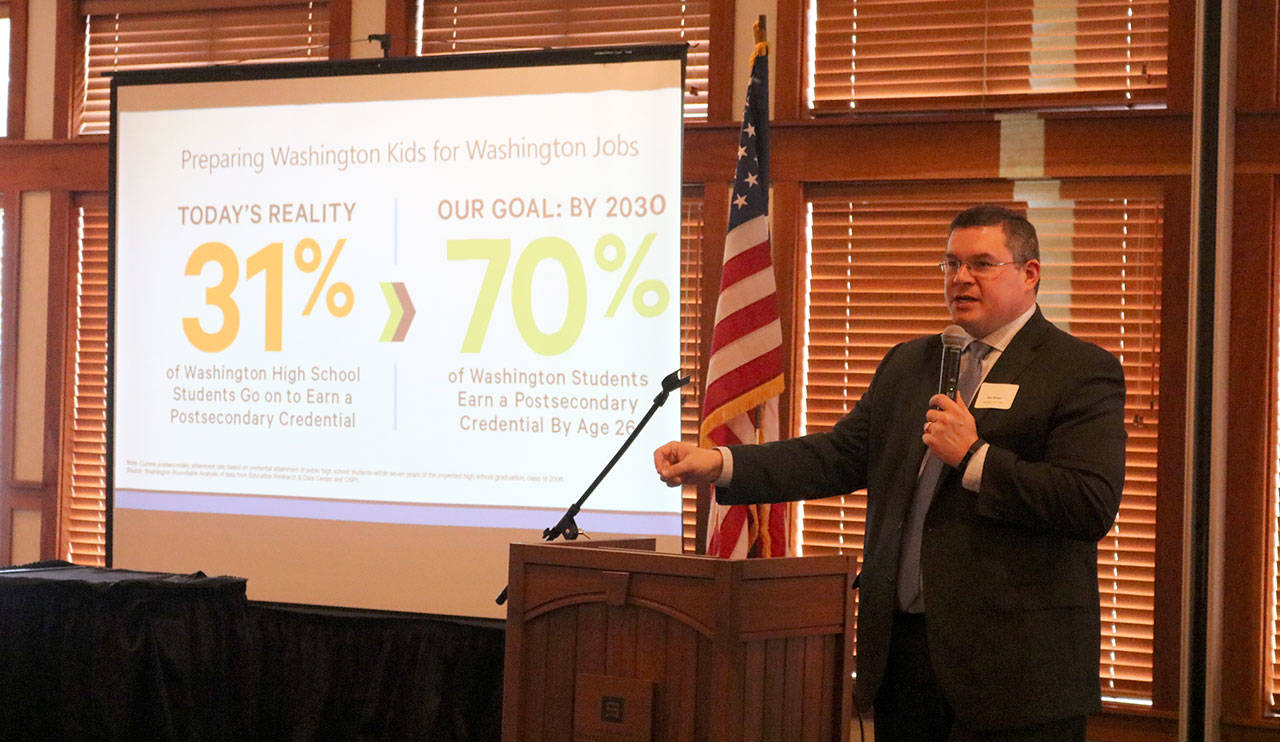As the future funding of K-12 education continues to be one of the biggest topics in the state Legislature this year, ways to progress the state’s education system, including the growing importance of post-high-school education, are also being examined.
To speak on the state of post-high school options in Washington, Neil Strege, vice president of Washington Roundtable, was invited to the Snoqualmie Valley Chamber of Commerce luncheon April 26. He presented the organization’s exploration into the ways businesses can work with schools to promote work experience and alternatives to a standard four-year college degree.
The Washington Roundtable is an organization made up of executives from major employers in the state including Puget Sound Energy, Alaska Airlines, the Bill and Melinda Gates Foundation and the Seattle Seahawks. Strege said that the members of the group work with staff to find ways to solve problems in the state without hiring lobbyists.
“They are senior executives from Washington’s biggest companies. Their CEOs, senior VP level, get together and work on Washington’s thorniest issues that affect the business climate,” Strege explained. “They join our association and we work on that together and they (send us) to Olympia and do that work. We primarily work on education, transportation and then business climate issues like the state budget and taxes, regulations.”
Strege spoke about data collected by Washington Roundtable showing a forecast of 740,000 job openings in the next five years, a combination of more than 430,000 people leaving the workforce and 300,000 new jobs. He also discussed the pathways students can follow to obtain Washington’s future jobs.
“We’ve got the jobs that the rest of the country wants and we’ve got them here in Washington. The question is who do we have to fill them?” he said. “Our message to kids is, it doesn’t really matter what you do after high school but you have to do something. You have to get some training beyond high school if you want to access the jobs that are going to be in the economy in the near future.”
Many of the pathways into future careers in the state require some form of post-secondary education or certification, Strege said. While four-year colleges have become a standard in the education culture, Strege stressed the importance of two-year education programs and skill-based certifications that can lead students to careers. The four-year college experience is not the only way to set up for a successful career, he said.
He used Starbucks’ new “pathway to admission” program as an example of a business that promotes education for its employees. When an employee at Starbucks has worked for three months, they become eligible for the Starbucks College Achievement Plan and can apply to the online Arizona State University, free. The company will reimburse students for tuition paid to ASU.
“So a barista at Starbucks, entry level, could go to ASU, get a retail management degree and be a store manager. That’s a pathway, a ticket to a career job,” he said.
Offering employees education options is just one way to increase the base of employable people in the state. Others include improving early learning and K-12 education systems to close education gaps with disadvantaged students.
“We need to increase the participation rate of students graduating from high school and going onto that post-secondary pathway, and once they start, we need them to finish… we need more students to know about the opportunities available to them so they are excited about them, so their parents are talking about them, and their teachers are talking about it.”
For more information, visit www.waroundtable.com.
The next Chamber of Commerce luncheon will feature Mayors Matt Larson and Ken Hearing giving state of the city addresses, 11:30 a.m. Wednesday, May 24, at the Club at Snoqualmie Ridge.


